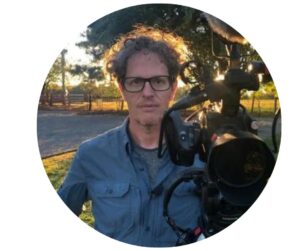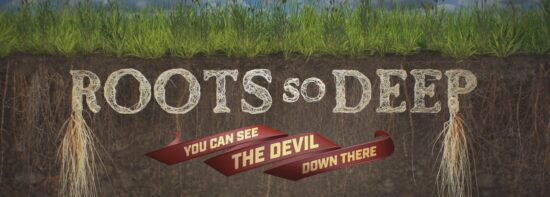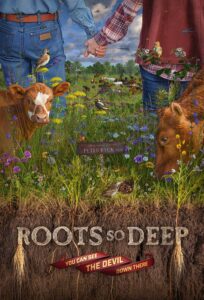Film series uncovers the benefits of adaptive multi-paddock grazing
The new docu-series Roots So Deep (You Can See the Devil Down There) is a culmination of nearly a decade of research, science and filming seeking to answer the question – Is adaptive multi-paddock (AMP) grazing better for the farmer, the land and the climate?
Since the Shade Haven mobile shade system is a tool used in successful managed grazing programs throughout North America and Europe, we are happy to promote this film and even caught up with Director Peter Byck for some insight into this four-part film series.
 “I started this project because I was worried about climate change, but very quickly I became an advocate for farmers,” notes Arizona State University professor and filmmaker Peter Byck. “That’s the first line in the movie, ‘I love farmers’, and my second line is ‘I love science’.”
“I started this project because I was worried about climate change, but very quickly I became an advocate for farmers,” notes Arizona State University professor and filmmaker Peter Byck. “That’s the first line in the movie, ‘I love farmers’, and my second line is ‘I love science’.”
Throughout the project, Byck and a team of scientists learned from the farmers – not the other way around. In return he and his team hope to help farmers be more profitable while helping the planet.
“This is not a we’re right, you’re wrong situation,” says Byck. “We see how grazing is being done, and we think we might have found a way for farmers to make more money, spend less money, have healthier land, and create a better ecosystem.”
Data-driven results
The Roots So Deep film series is based on the AMP Grazing Southeast U.S. research project which compares conventional grazing to AMP grazing. The project followed five sets of farms over five years. Each set consisted of one farm grazing conventionally; the other practicing AMP grazing. The data-driven results are pretty stark.
The AMP-grazed land has a wider diversity of forage and three times the bird life and microbial life. Additionally, the AMP-grazed pastures sequester four times the carbon and better withstand weather extremes.
Prior to filming the Root So Deep series, Byck created the short film Soil Carbon Cowboys. The regenerative-grazing-focused film features grazing expert and Shade Haven user Allen Williams along with Gabe Brown and Neil Dennis. That ultimately led to the AMP grazing research project behind the current film series.
Though planning and fundraising began years earlier, the scientific research for the AMP Grazing Southeast project kicked off in 2018.
“This project from the very beginning is about asking questions and trying to find answers, without any blame or shame,” notes Byck. “We want every farmer to know the power of their decisions and how important they are to the ecology of the planet.”
During the filming, Byck was intrigued by the curiosity the farmers had for what their neighbor was doing. “There was no judgement. It was curiosity. To me that was a huge opportunity…because we were there filming, I could say, ‘hey, do you guys want to talk about this’.”
He hopes the film will continue to spark conversation between farmers.
The science team’s data on birds was particularly eye-opening. “The data revealed how many more grassland birds were landing and living on one side of the fence and not on the other side, and the only difference was the method of grazing,” explains Byck. “I saw how powerful that was for some of the farmers to find out that their land wasn’t a good habitat for these birds.”
Creating life-supporting habitat begins with soil. Byck notes that soil is the base of both the problem and the solution. “If you mistreat our soils, they emit carbon, if you treat them right, they suck down carbon. The farmers that are really focused on soil health are leading the way to solving climate change. Our place of common ground is soil health.”
Check out the Roots So Deep trailer here!

